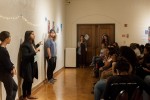Raunak Rupani performed mashups of songs in French and Mandarin during an open mic event Wednesday.
“An easy way to get to learn about different cultures is to combine it with something you love, and for me it was music,” said Rupani, a fourth-year economics student from Dubai.
Rupani’s performance was one of many acts at The World at UCLA, an open mic event held Wednesday by the Cultural Affairs Commission, the Undergraduate Student Association Council General Representative 2 Office and the International Student Leadership Coalition. The event also displayed the USAC General Representative 2 Office’s Second Impressions project and the Dashew Center’s research and storytelling project International Voices.
These projects feature different international students’ stories on confronting stereotypes, being away from their home countries and their experiences at UCLA related to their cultural identities.
Ahm Lim Lee, a third-year political science and economics student and the internal vice president of ISLC, said she thinks the open mic event allowed students to share their stories in a less restrictive environment. CAC already holds an open mic event called The Word on Wednesday every week, so ISLC and CAC decided to combine the two events for one night.
During the event, Bianca Brown, The Word’s director and a third-year philosophy student, asked the audience members to write down the name of a culture they wanted to learn more about and questions about that culture on a piece of paper. She then put the questions into a box and read them aloud to open up discussion. Students talked about various topics, including how hosting large sporting events affects residents of nearby communities and how soccer matches can unify a country.
One student said she thinks there is a disconnect between American and Indian perceptions of wealth. For example, many blue-collar workers in India have to work 12 hours a day in 120-degree weather for wages substantially lower than the United States federal minimum wage.
Brown said she wanted the audience members to reassess their behavior toward international students, and to be aware of how they can make them uncomfortable through stereotypes and microaggressions.
“A safe space can sometimes feel unsafe,” Brown said. “I want the speaker to feel like they can let the audience know if they feel unsafe or uncomfortable about something.”
Rupani said he thinks it is important to learn about other cultures because students are constantly surrounded by people that come from different backgrounds and have to learn how to interact with them.
“UCLA students acknowledge international students exist, but never really try to pursue an understanding of them,” he said. “Students follow the path of least resistance and don’t really get to know them.”

Events like this are eye opening, because being an international student can be lonely and difficult, on top of our already complex culture and language. Assimilation assistance must come from numerous sources to aid these young people embarking on their life’s journey. Most struggle in their efforts and need guidance from schools’ international departments, immigration protection, host families, concerned neighbors and fellow students, and even informative books to extend a cultural helping hand so we all have a win-win situation.
An award-winning worldwide book/ebook that might be of help to anyone coming to the US is “What Foreigners Need To Know About America From A To Z: How to Understand Crazy American Culture, People, Government, Business, Language and More.” Used in foreign Fulbright student programs and endorsed worldwide by ambassadors, educators, and editors, it identifies “foreigners” who became successful in the US and how they’ve contributed to our society, including students.
A chapter on education explains how cope with a confusing new culture, friendship process and daunting classroom differences. Some stay after graduation. It has chapters that explain how US businesses operate and how to get a job (which differs from most countries), a must for those who want to work with/for an American firm here or overseas.
It also has chapters that identify the most common English grammar and speech problems foreigners have and tips for easily overcoming them, the number one stumbling block they say they have to succeeding here.
Good luck to all at UCLA or wherever you study or wherever you come from, because that is the TRUE spirit of the American PEOPLE, not a few in government who have the loudest voice!
Great article!! Really gives insight into the community of international students and offers a unique perspective of how they are perceived in our campus community.